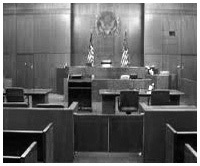Pennsylvania Divorce Law
To initiate a divorce in Pennsylvania, you need to file a Complaint in Divorce. Within the complaint you are asking the court to terminate your marriage under specified grounds. Pennsylvania divorce law provides the options of obtaining a divorce based on "Fault" grounds or "No-Fault" grounds. After obtaining your fault or no-fault grounds, you will proceed with your divorce in a "Contested" (by fighting over your issues) or "Uncontested " manner (by reaching an agreement on all issues).
Fault Based Grounds
 Filing a divorce complaint based on the "fault" of the other party can often trigger a contest. Grounds for a divorce based on fault include: Filing a divorce complaint based on the "fault" of the other party can often trigger a contest. Grounds for a divorce based on fault include:
- Willful and malicious desertion, without reasonable cause, for a period of at least one year
- Adultery not condoned by the spouse seeking the divorce
- Extreme mental or physical cruelty
- Indignities to the person of an innocent spouse rendering the spouse's condition intolerable and life burdensome
- Having knowingly entered into the marriage while a former marriage was not dissolved (i.e. bigamy)
- Insanity or a serious mental disorder which resulted in the spouse being confined to a mental institution for eighteen (18) months immediately preceding the filing of the divorce complaint and where there is no reasonable prospect that the spouse will be discharged from confinement for the next eighteen months
- The spouse has been convicted of a crime and has been sentenced to at least two (2) years of imprisonment
No-Fault Grounds
A Pennsylvania "No Fault" Divorce may be granted under two (2) circumstances:
1. Divorce by Mutual Consent
A Pennsylvania court will grant a mutual consent divorce when the court determines that there is "mutual consent" by the parties that their marriage be dissolved by divorce. For a court to grant a mutual consent divorce, the basic requirements are that:
- The moving party alleges that the marriage is irretrievably broken
- Ninety days have passed from the filing and service of the divorce complaint
- Affidavits by both parties are filed confirming that each party consents to being divorced
2. Divorce Based on 2 Year Separation - Irretrievable Breakdown of the Marriage
A Pennsylvania court will grant a no fault divorce due to the "irretrievable breakdown" of the marriage if:
- One party files a complaint and an Affidavit alleging that the parties have been living separate and apart for a period of at least 2 years and that the marriage is irretrievably broken
And the other party:
- Does not deny the allegations set forth; or
- Denies one or more of the allegations, but the court decides, after notice and a hearing, that the parties have lived separate and apart for at least two years and that the marriage is irretrievably broken
Contested vs. Uncontested Divorce
When a Spouse Seeks a Pennsylvania Divorce, it may be Contested or Uncontested
Contested Divorce
Sometimes, despite the best intentions of all concerned, it is impossible to reach a divorce settlement agreement on all the issues. At this point, the divorce becomes contested. This means the divorce case and all disputed issues must be litigated in front of a judge. The most common areas of dispute between spouses are:
- Alimony
- Property and asset division
- Child Custody
- Child Support
 Many people hold unrealistic expectations as to what they "deserve" in a divorce settlement. Holding these unrealistic expectations can easily turn what should be an uncontested divorce into a contested divorce.
A person who is not represented by an experienced Pennsylvania family law attorney like Mary Beth Reinecker is likely to be seriously disadvantaged by not knowing what to expect or the applicable laws, procedural rules or how to present evidence in court, such as the testimony of expert witnesses. If you or someone you know faces the prospect of a contested Pennsylvania divorce, family lawyer Mary Beth Reinecker is the person to have by your side and vigorously advocate on your behalf. Many people hold unrealistic expectations as to what they "deserve" in a divorce settlement. Holding these unrealistic expectations can easily turn what should be an uncontested divorce into a contested divorce.
A person who is not represented by an experienced Pennsylvania family law attorney like Mary Beth Reinecker is likely to be seriously disadvantaged by not knowing what to expect or the applicable laws, procedural rules or how to present evidence in court, such as the testimony of expert witnesses. If you or someone you know faces the prospect of a contested Pennsylvania divorce, family lawyer Mary Beth Reinecker is the person to have by your side and vigorously advocate on your behalf.
Uncontested Divorce
An uncontested divorce is when parties can reach an agreement on the basis for the divorce as well as on the other important issues that may arise when a marriage is dissolved, including:
- Alimony
- Property and asset division
- Child Custody
- Child Support
Every couple seeking to divorce should first attempt to work out mutual terms for their separation in the hopes of proceeding by way of an uncontested divorce. Working out an agreement will save you time and money by bypassing the lengthy litigation and trial process.s
In an uncontested divorce, either an attorney or a mediator can prepare a written property settlement agreement for the parties to sign and forward it to the court, without the parties having to appear before a judge. Even though uncontested divorces can still be emotionally painful because of the sensitive issues involved, an uncontested divorce settlement agreement saves on attorney's fees, miscellaneous court costs, time and stress.
An uncontested Pennsylvania divorce settlement agreement can be achieved:
- By the parties having their attorneys negotiate for them
- By the parties working out their own agreement, or
- By the parties working with an experienced divorce mediator to reach an agreement
The issues involved in a divorce can be very emotional for either or both parties. They are also complex legal issues such as: the past and future valuation of property and assets, assessing future earning potential, and tax considerations. Therefore, many divorcing couples find they are unable to negotiate with each other by themselves, making it more likely that they will each have to incur the expense, time and stress of appearing in court and letting a judge decide how their marital estate is to be distributed. It is therefore advantageous to have an experienced Pennsylvania family law attorney to consult with to prepare a negotiated settlement agreement that addresses all the issues that will be in an acceptable format which a judge will be willing to sign as an order.
The parties can also agree to try to work with an experienced Pennsylvania divorce mediator to attempt to reach an uncontested divorce settlement agreement. An experienced divorce mediator can keep the negotiations between the parties civil and focused on the issues that they must resolve. Most importantly, the mediator can make sure that the parties consider what is best for themselves and their children. Other important benefits of working with an experienced divorce mediator such as family law attorney, Mary Beth Reinecker, are that:
- Divorce mediation is considerably less expensive than litigation
- Divorce mediation is confidential and private
- The case proceeds on the parties' own time schedule, not the court's; and
- The final settlement agreement is tailored to your family's needs and circumstances
Call the Law Office of Mary Beth Reinecker today at: (267) 702-3188 for a free initial consultation to learn how she can help you sort through your complicated family law matters and to discuss your options. You may also contact Attorney Mary Beth Reinecker using the form provided on this website.
*Evening and weekend hours are offered to accommodate your schedule as well her newest service, video conferencing from the comfort of your home or office! |





